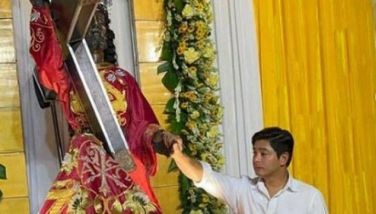Dokyu takes the road less taken
May 14, 2005 | 12:00am
 When TV networks lean on going mainstream, taking refuge in the comfort of pop culture and its guaranteed ratings and revenues, ABC takes the road less traveled with a fresh and atypical Public Affairs show to kick-off this Wednesday, May 18 at 11 p.m. (after American Idol), Dokyu, Ang Bagong Mata ng Pinoy Documentaries. The show is a venue for student filmmakers–fledgling artists–to showcase their independently made documentaries on national TV and be acknowledged by experts and the general public. Coming from "commercially uncorrupted geniuses," these well-chosen amateur, some award winning, documentaries from students around the country can be the next wave of Pinoy documentaries.
When TV networks lean on going mainstream, taking refuge in the comfort of pop culture and its guaranteed ratings and revenues, ABC takes the road less traveled with a fresh and atypical Public Affairs show to kick-off this Wednesday, May 18 at 11 p.m. (after American Idol), Dokyu, Ang Bagong Mata ng Pinoy Documentaries. The show is a venue for student filmmakers–fledgling artists–to showcase their independently made documentaries on national TV and be acknowledged by experts and the general public. Coming from "commercially uncorrupted geniuses," these well-chosen amateur, some award winning, documentaries from students around the country can be the next wave of Pinoy documentaries.
Breathing life to the network’s brand, the minds behind this TV innovation–ABC News’ Jim Libiran (News and Public Affairs production head), Anne Torres (news manager and Dokyu host), Dodge Dillague (news creative director and Dokyu critic); Bing Maaño (Dokyu executive producer) and Ramon Bautista (Dokyu director)–speak about being Iba, and the motivation behind taking such risk in this highly-commercialized game of TV programming.
What is different about Dokyu and how do you think would it play in mainstream TV today?
Anne Torres: Dokyu definitely is the first in Philippine TV that would offer the students a venue to show their work. The youth in general have often been sidelined; they are not really taken as seriously as the pros. But the students, the youth, have something to say. And it is time for us to listen to them. They have been watching us. Maybe it’s time for us to watch them, see what they see, and learn from them.
Dodge Dillague: Dokyu in itself will be an alternative to what is mainstream, to what is the broadcast norm. Dokyu will present a different version on how to approach a documentary.
What inspired you to develop this show?
Jim Libiran: We need new blood. We need artists walking on the edge, who do things not for commercial purposes. ABC wants to be iba. How can we be different if we will not listen to new voices?
Can you give us a picture on what to expect in an episode?
Bing Maaño: Each episode will show two student documentaries tied up by the same theme–poverty, faith, religion, society, etc. Anne Torres, the host, ties up the segments and does background interviews of the filmmakers. There will also be critics who will measure each docu’s pros and cons.
As the director, how did you link two different documentaries together in an episode?
Ramon Bautista: An episode will take on the character or treatment of the featured documentaries. That will be the linking factor. Generally, the show will have a look of an independently done documentary. It will have a kind-of avant-garde treatment.
As a young director yourself, were you able to learn new ideas from these student documentaries?
Bautista: Of course! Like for example, I am inspired by the students’ courage on trying to understand the life of marginalized people. They infuse fresh ideas into a topic that is discussed even in mainstream TV. I see new kinds of treatment, new ways of directing shots and camera angles.
How do you think would this show contribute in the development of Philippine TV Programming?
Torres: It is a way to understand the youth, which has a big audience-share. The show really showcases what the youth does. This is how they think, this is how they see things, and it is a way for them to bring it out. Two, it could also be a kind-of school-on-air because these student documentaries will be critiqued by experts in the field.
Libiran: It will definitely be a good contribution to Philippine TV but only if people watch it. Only if students respond to it. Otherwise, we might fall victim to the state of Philippine TV programming today which is highly commercialized. In terms of quality, Dokyu, is very raw, sometimes amateurish. But as I always say, we have to find the pearl in the mud and there are many pearls in many of these documentaries.
Dillague: Dokyu offers a fair chance for those artists who couldn’t normally compete in mainstream TV. The show gives a chance for first-timers to showcase their genius, their alternative art, in a venue that is mainstream. It’s a chance to showcase what they can do with limited production equipment and human resource.
What do you think is the importance of promoting independent films/artists such as the ones shown in Dokyu?
Libiran: Independent artists will continue doing their art whether or not we give them space. It’s up to us to recognize and join them. And if we do, we will definitely be on the cutting edge because this is where good ideas come from.
Torres: When you’ve been in this business for so long, sometimes you have a way of seeing things already. This program offers a fresh perspective by students who have grown up in a different generation altogether and have something to say.
Dillague: It is very important to give a venue for these so-called "struggling artists" so they will be noticed, recognized and discovered, not only by ABC, but other networks as well.
Bautista: These documentaries have a distinct Pinoy flavor. By promoting them, we help develop a brand of documentaries that is distinctly ours, and that can compete with docus done elsewhere in the globe.
What do you look for in the documentaries submitted to you?
Libiran: Rawness. Uniqueness of point of view. Not so much on technique but more on honesty. Some of the documentaries were made without a plan of showing it to the world, and we had difficulties in convincing some filmmakers. But these are good-finds–its rawness and honesty astound. Present mainstream documentaries don’t even come close.
Dillague: A documentary has to have a stand. It is simply an expression of a filmmaker through his images. It has to be personal. It has to have heart and focus.
Despite its unpopular concept, what pushed you to support this project?
Torres: Because I believe in what the youth is doing and I believe in the staff. The staff had worked so hard to get this on-air. That makes me want to work more for the show.
Maaño: Being a professor myself, I’ve always believed that the students have the eye for producing documentaries entirely different from those we see on TV. Of course they are not as spectacular, or as technically polished as those on national broadcast. But then, when you get to watch them, you get to realize that they, the youth, have something to say that can serve as inspiration for us. We can learn from them.
BrandSpace Articles
<
>
- Latest
- Trending
Trending
Latest
Trending
Latest
Recommended


































